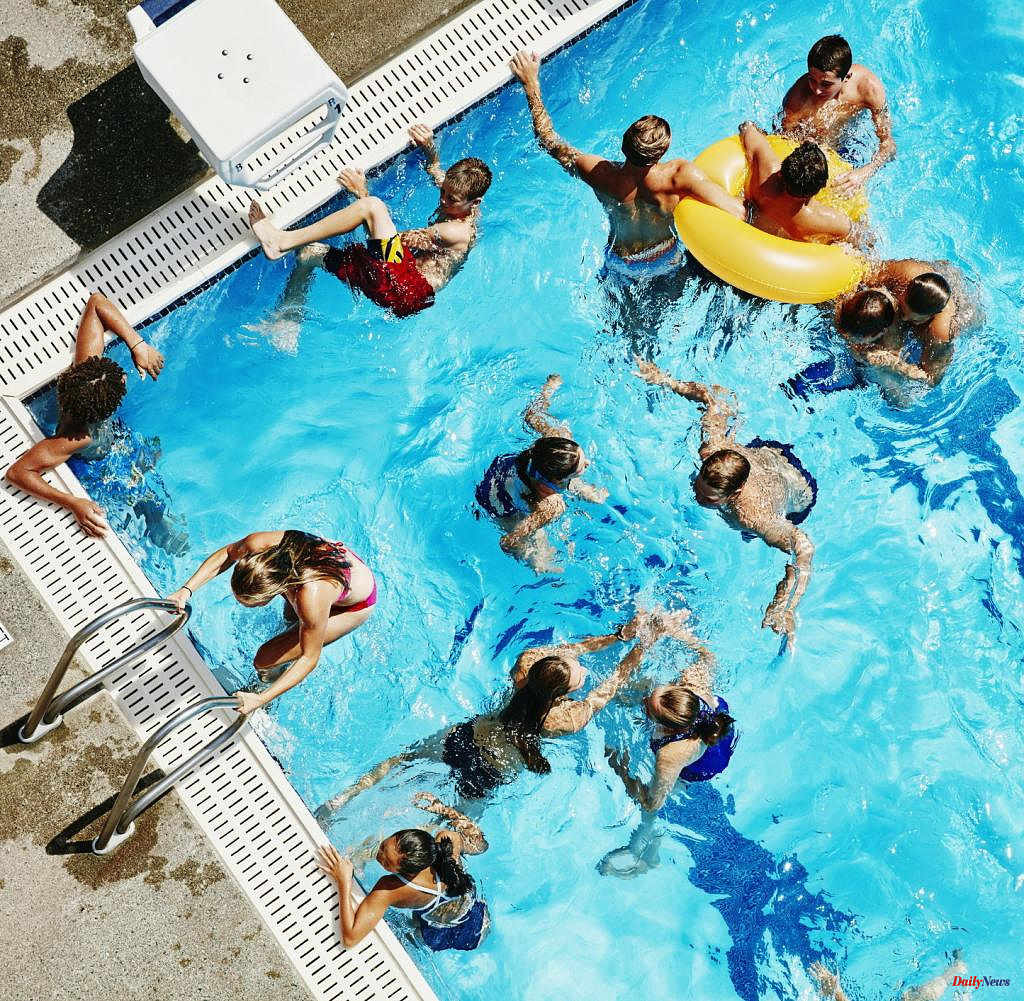The baths in Berlin are better than their reputation. Anyone who goes swimming in the Humboldthain summer pool in the Mitte district these days will experience politeness and the typical nonchalance of the capital. Even with long queues and more than 30 degrees in the shade, those waiting in front of the entrance behave in a friendly manner, even if they are annoyed by the obvious waiting time of up to three quarters of an hour. There are problems with the online tickets and the second ticket booth only opens when the colleague is there, according to the employees.
That's how it is in Berlin. Things don't work, but you don't take it too seriously. In front of the entrance, backpacks are checked by two security employees. No glass bottles with you? OK. Again, no hassle, everyone is friendly and cooperative. Every now and then two employees patrol the premises in case something happens. there are no problems. Live and let live. Now and then the lifeguard yells into his megaphone that you shouldn't climb on the lines that limit the swimming lanes. Everything known from childhood. No reason to worry.
The CEO of the Berlin baths recently said: "This violence affects us very much." The Columbiabad in Berlin-Neukölln had hit the headlines again, several young men had attacked and injured security staff and rescue workers. It wasn't the first time this summer that the Columbiabad caused a stir. Similar incidents in other pools in Berlin had sparked a debate about the safety of bathers in the past few weeks. At the climax, the top German lifeguard even felt compelled to explain to the "Bild" newspaper: "I would not go to the outdoor pool with my three grandchildren." How terrible.
The image of flying fists and blue lights dominates our perception, not fries and a water slide. What happened? The little man's garden pool has fallen into disrepute. Wrongly. After all, public baths have important social functions.
You just have to go back in time before it existed. It was not until the middle of the 19th century that outdoor pools as we know them in Germany came into being. At that time an unbelievable act of emancipation.
Public bathing had long fallen into disrepute because of its customs. Changing facilities and swimwear ensured that decency was respected. With the advent of industrialization and the influx into the cities, the outdoor pool offered cooling for everyone and especially for every woman and every social class. And so it has remained to this day. If you can't afford or don't want to have a pool in your own garden, the way to the bathing lake or outdoor pool is not far on hot summer days - especially with the current temperatures. Especially in large cities like Berlin, the municipal outdoor pools are a low-threshold opportunity to refresh and cool down.
That's why they're popular. According to the German Association of Towns and Municipalities, 80 percent of Germans are of the opinion that bathrooms are indispensable. "Open-air pools are among the few leisure facilities where people from all income brackets and age groups meet," says the current report on municipal pools. They are an important part of the local social services of general interest.
There are also sporting reasons for this: alongside cycling and running, swimming is the most popular sport in Germany. And children usually learn that in public baths. There they can try it out for themselves and experience the natural use of water. What the waiver means has recently become apparent: the closures of the public pools during the corona pandemic meant that whole cohorts of young people were unable to learn to swim and now have to laboriously catch up.
And apart from that: How many childhood loves found their beginnings in German spas? Hearts were given and lost again. Most outdoor pool relationships didn't survive the end of summer, but they didn't have to either. In addition to the water slide and the French fries stand, not only do the first attempts at swimming take place, but also the first attempts at walking in love. Anyone who has not suffered lovesickness on a towel on a green meadow has not lived.
And outdoor pools are a social melting pot. This is where high school students meet special needs students and seniors meet the Tiktok generation. What Federal President Frank-Walter Steinmeier wanted to create for everyone with an extensive year of service takes place every day in public baths. A communal togetherness and points of contact between people with different social backgrounds. It doesn't matter whether you're a Dax board member or a Hartz IV recipient: everyone is equal in the queue in front of the chip shop.
And if you don't take care of each other, nothing works. In the water, when queuing in front of the diving towers, if you don't try to watch out for each other here, you'll be thrown out. The most recent incidents in Berlin swimming pools have also shown this: In German swimming pools, law and order is still maintained, if necessary with the help of the police. This is how you can see the disturbing incidents. Outdoor pools are not legal vacuums – on the contrary.
For Michael, who goes swimming with his son in the Humboldthain summer pool this morning, the pool is also a piece of freedom in the cramped city. "I grew up in Berlin-Prenzlauer Berg, for me this is somewhere at home," he says. Of course there are always gatherings of young men, mostly of Turkish and Arabic origin, that is normal here at Gesundbrunnen with its proximity to the problem district of Wedding, but he has never really had any trouble because of it.
"The press exaggerates all of that a little," explains Thomas, in his mid-60s. He knows the Columbiabad and the Prinzenbad from his time in Kreuzberg. They are beautiful baths, in which he always liked to be. Now it's rummaged around every few years when a couple of young people fight each other. He has never had any problems here in the Humboldthain anyway.
Sarah, in her mid-30s, is a bit concerned. Because of the reporting, she did not want to go to the baths in Berlin-Kreuzberg. But she doesn't have to, there are enough others to choose from "and this is much closer to my apartment."
I, on the other hand, have to leave the bathroom. My stomach is growling, I don't have enough change for a portion of fries and the kiosk will not accept card payments even in summer 2022. Some things just never change.












